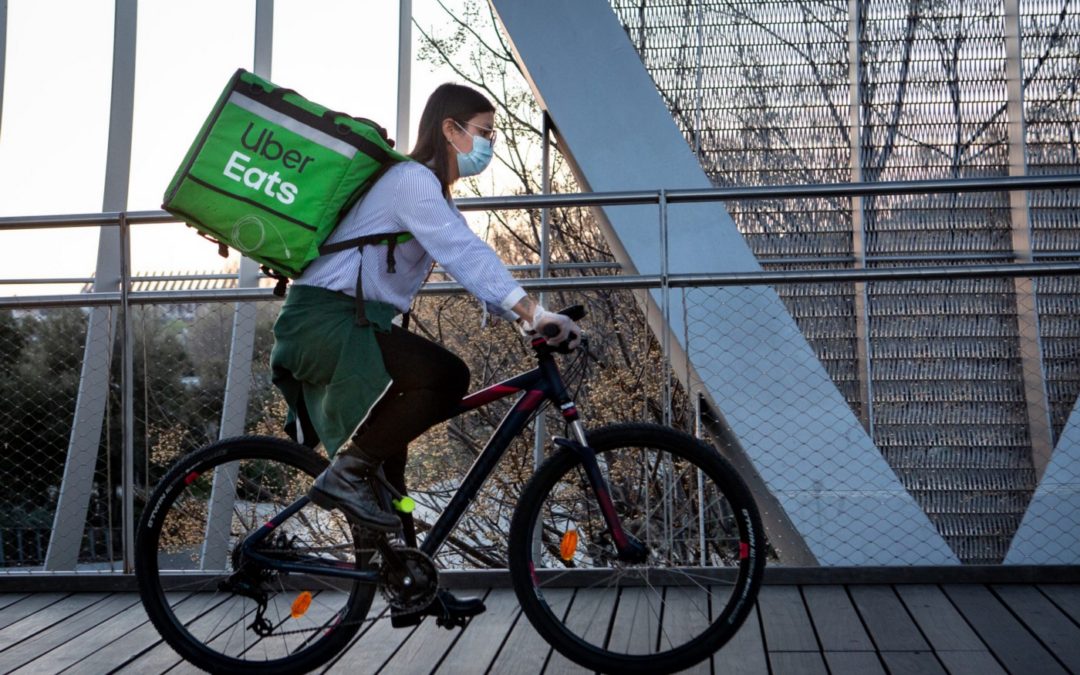
by Innovative Mobility Research | Apr 29, 2020 |
Image Source: Business Insider Susan Shaheen and Adam Cohen 4/26/20 Transportation Network Companies (TNCs, also known as ridehailing and ridesourcing) generate a significant percentage of their gross bookings from trips in large metropolitan areas, including trips to and from airports. For example, in 2019, Uber generated 23% of its ride gross bookings from five metropolitan areas — Chicago, London, Los Angeles, New York City, and the San Francisco Bay Area. Because the COVID-19 pandemic has disrupted operations in large metropolitan areas and demand for air travel, income for drivers and the financial performance of the for-hire ride sector are being adversely impacted. In mid-March, Uber announced that rides were down 60 to 70% in Seattle, an area impacted early by COVID-19. Vehicle miles traveled (VMT) can be used as a conservative indicator to estimate the drop in TNC demand. For the above five cities, average VMT is 37 to 50% less than it normally was for the week ending April 13, 2020 based on INRIX data. However, TNC demand has probably dropped much more due to the drop in demand to access bars/restaurants and airports. COVID-19 has caused an unprecedented decline in commercial aviation traffic. United Airlines forecasts that it will fly fewer people during the entire month of May 2020 than they did on a single day in May 2019. Traffic on U.S. carriers was down 97% year-over-year during the 7 day period ending on April 12, 2020, according to Airlines for America (A4A). Read full article...

by Innovative Mobility Research | Apr 14, 2020 |
Fleet Forward Staff April 14, 2020 Fleet Forward asked eight subject matter experts from various corners of the travel, transportation, and mobility spectrums to assess the short- and long-term impacts of the coronavirus pandemic on mobility. We asked them: What will be the state of shared mobility/carsharing in the near future and further out? Will the pandemic accelerate certain mobility options, or will latent hesitancies exist from a health/safety standpoint that will dampen the market for a long time? Will the pandemic force shared mobility operators to rethink their services or business models? First Mobility Recession Susan A. Shaheen, Ph.D., Co-Director, Transportation Sustainability Research Center,University of California, Berkeley: This is the first recession for many of the shared mobility service providers. Numerous concerns exist about the financial viability of some of these services, particularly those that are currently losing money. The impacts of this downturn could be exacerbated by a reduction in overall travel behavior and social distancing. Some communities have banned shared mobility services associated with concerns of COVID-19 even though these services can provide a critical form of mobility for essential trips for carless households. In other cases, we’ve seen the rise of their use, for example, micromobility services in New York City prior to shelter-in-place orders… Read the full...

by Innovative Mobility Research | Apr 2, 2020 |
Larry Buhl Capital & Main April 1, 2020 The $2 trillion Coronavirus Relief Bill signed into law last week, the largest aid package in U.S. history, also contained the largest aid package ever for U.S. transit agencies: $25 billion. The money comes at a time when ridership and revenues have plunged during the COVID-19 health emergency. Experts say the money, which has basically no strings attached, should be more than enough to keep workers employed, at least through the year. But transportation experts say that after the health crisis abates and jobs come back, mass transit could look somewhat different. Owing to stay-at-home orders in many cities, transit ridership has been in freefall through March, according to Moovit, an urban mobility app. In its request for federal aid, New York’s Metropolitan Transportation Authority (MTA), the largest in North America, asked for more than $4 billion from Congress to offset a loss of revenue from a steep decline in ridership. In San Francisco, where residents have been ordered to stay home since mid-March, the Bay Area Rapid Transit system (BART) has seen a ridership decline of 90 percent and has been forced to reduce service. It is not yet clear how the money will be divvied up among the different transit agencies across the U.S., nor is it clear how each agency will use the money it receives. The law comes with more suggestions than strings: It simply says emergency funds are “to prevent, prepare for and respond to coronavirus.” According to the bill, the money is reimbursement for lost operating costs accrued since Jan. 20, 2020, and could be...

by Innovative Mobility Research | Mar 16, 2020 |
CommuteCon will take place on April 1, 2020 from 9am – 2pm PST. CommuteCon is a free online conference that brings together people focused on finding smart, sustainable solutions to big mobility challenges. Join hundreds of your fellow commuter management leaders from around the world for an amazing lineup of presentations from industry thought leaders. Speakers include: Susan Shaheen, Co-Direct at UC Berkeley’s Transportation Sustainability Research Center; Timothy Papandreou, Founder at Emerging Transport Advisors; Emma Huang, Principal Transportation Planner at LA Metro Office of Extraordinary Innovation; and Danielle Glaser, Head of Bay Area Transportation at LinkedIn; among others. If you are interested in participating, you can learn more about the conference and...

by Innovative Mobility Research | Jan 17, 2020 |
Aarian Marshall December 19, 2019 The US is about to lose another car-share service. On Wednesday, the Daimler- and BMW-owned entity that operates the service Share Now said the company’s cars would disappear from North American streets by the end of February 2020. For customers in New York, Montreal, Seattle, Washington, DC, and Vancouver, that’s a bummer. It’s a bummer as well for those who enjoyed short-term rentals in London, Brussels, and Florence, Italy—service will stop there too. The story of Share Now, formerly known as Car2Go, is emblematic of the twisty path that transportation services took in the 2010s. Founded by Daimler in 2008, Car2Go arrived at a moment of smartphone-fueled optimism about “mobility” tech. A company called UberCab would sprout in San Francisco a year later. Amid talk of falling car ownership and rapid urbanization, automakers were on the lookout for the next big thing. Car2Go was an experiment in what car-sharing professionals call “point-to-point” sharing. The company struck deals with cities to allow customers to locate, pick up, and park Daimler-owned cars—extra-compact white and blue Smart Cars—almost anywhere on city streets. (Some competitors, like Zipcar, have dedicated parking spots for their users.) In February, a decade into a new world of tech-driven experiments, Daimler and BMW announced they would combine their mobility services under one entity, called Share Now. By October, it was clear that the business was in trouble, when the company said it would pull out of half its North American markets. Now, Share Now will operate in fewer than 20 cities worldwide, with its largest operations in Germany and Italy. In a statement,...






